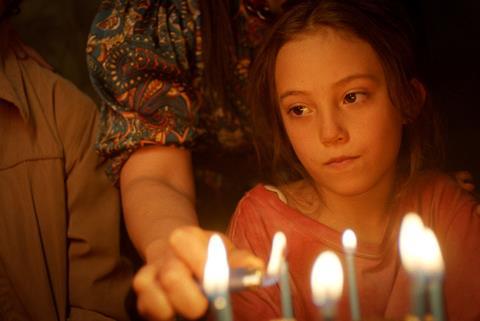Lila Avilés revisits her childhood and a chaotic birthday celebration for her second feature Tótem, which premieres in Competition

Lila Avilés made waves with her debut feature The Chambermaid (La Camarista), which premiered at Toronto 2018 before going on to represent Mexico in the international feature Oscars race in 2020. Her second feature Tótem is premiering here today (February 20) in Competition at the Palast.
The film is a luminous reflection on life, death and family, unfolding over a chaotic birthday celebration in a big Mexican family home. It is told through the eyes of seven-year-old Sol (Naima Senties), whose father is terminally ill — Avilés wrote the script, which has autobiographical undertones. Tótem is produced by Limerencia Films, Laterna, Paloma Productions and Alpha Violet Production; Alpha Violet handles international sales.
You followed a worker in a Mexico City hotel in your debut The Chambermaid. This time you’ve shifted to a very different canvas — a home populated by a multigenerational family.
In life, in society, we tend to focus on what’s going on outside, and see the outside shell rather than what’s inside. I wanted to explore the idea of the house and the home as our inner world, of ourselves and our family, which is the root of it all.
I became a mother when I was very young and, somehow, I needed to go back to my childhood, those first years where everything is so fragile. Go back and reacquaint myself with little Lila now that I have a teen daughter. And to revisit our losses too. I see it also as a present to my daughter. That was the starting point.
How did you feel working on your second feature?
Very lucky. In my life I’ve had many jobs. I’ve worked as an assistant director, make-up artist, costume designer, production assistant and actress. I did not go to film school but I learned on the go, and all the time I kept dreaming of becoming a filmmaker one day. It’s a joy to be able to be where you feel you belong and I feel I belong in the world of cinema. Colleagues always warn you about the second feature. It’s become a bit of a cliché or taboo. The truth is, if things don’t go well you can always have a third or fourth try. Filmmakers we all admire had the chance to play, explore their options, and that’s what I would like to keep on doing.
How did you approach making Tótem?
This film is warmer [than The Chambermaid]. It was the only way to do it. I wanted the cast and crew to feel loved and free, and give them the tools they needed to feel at home. With our cinematographer Diego Tenorio, we tried to find a playful approach to the camerawork, with long takes that required a lot of work before shooting but then flow naturally.
How did you find the child actress?
Gabriela Cartol [who played the main character in The Chambermaid] worked with me in the casting process. We became close during the making of my first film and I knew she would help me find the child actress we needed. I was very aware the film would not work if we failed there. It’s like a Cassavetes film: that’s where the salt and pepper is — it’s in the acting. We ended up finding Naima Senties, who is the niece of the actress who plays her mother in the film. She came to the casting having never worked in film before and she was amazing. When I started talking with her, it just felt right. She is very chatty, so small but so wise.
You even look a bit alike.
Her mum jokes about that: “She’s really your daughter, isn’t she?”
Do you feel there are more opportunities now for women filmmakers working in Mexican cinema?
Yes, and we’re ready for everything. There is a new generation of women directors in Mexico, Spain, Argentina, Colombia. [It’s] a result of what women have fought for in the past, and that we will have to keep fighting for thinking of future generations. Cinema has given me everything and the work, at the end of the day, speaks for you. Art builds bridges that go beyond the socioeconomic gender codes, idiosyncrasies or other labels. As women filmmakers, we are saying we are here. We have a voice.

























No comments yet